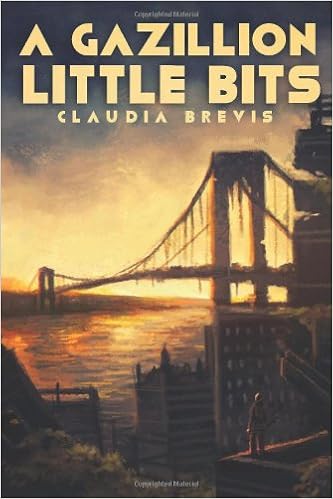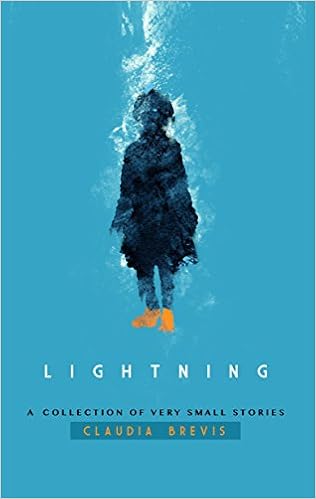Today's guest is multi-talented Claudia Brevis, dramatist, composer, novelist and enthusiastic New Yorker. Today she joins us to discuss her acclaimed post-apocalyptic novel A Gazillion Little Bits set in New York in 2256. (Personally, I don't think we'll last that long).
MJN: I understand you are a lucky native of NYC. The city
makes an excellent setting for a post-apocalyptic novel. It's so diverse and
liberal, and it lends itself as a likely epicenter of a major disaster (as the
events 9/11 have shown). How did it feel making NYC, the city, I assume, you
love, the setting of your gritty novel? Do you ever have nightmares about
waking up and seeing what your protagonist saw?
CB: Thanks, MJ! I've lived in NYC for most of my life and am
very passionate about this place! There's always something new to find-- a
building, a park, a street-- interesting to research and exciting to explore.
When we drive around town my head is usually out the window, looking up at
cornices, around at alleyways, back at street corners, and in fact, it was
during one such drive that A Gazillion Little Bits showed up in my brain. I
began to see in my beloved city images of change that I came to understand
belonged to a distant future! So, in a sense, the book chose its own locale.
Interestingly, or maybe oddly, exploring this future world was somewhat
comforting. There is the sense that this city always changes but it will always
be here.
MJN: There are so many theories regarding to when the world
will end and in which manner. Some authors reveal the causes of the apocalypse,
while others prefer to stay ambiguous. I keep thinking of Cormac McCarthy's The
Road. You can sort of detract that the culprit is a cataclysmic volcano.
CB: I tried to focus on the aftermath, but I thought deeply
about how a world could end up as I've written. I used history as a guideline
to some extent and took into consideration the spiraling effects that natural
disasters would create. So although it might be major earthquakes, tsunamis and
other extreme planetary changes that began the descent in my novel, it was also
disease, fall of government, disruption and dissolution of society as a result
of these multiple, sudden disasters. As a genealogist and researcher I know
that information is lost very quickly between generations, and it was easy for
me to imagine that 200 years in the future my characters wouldn't know what had
happened to create the world they lived in. Most of the story is told through
the viewpoints of these future characters, so the reader's knowledge is limited
to the characters' knowledge! I did try to leave enough hints that the reader
could more or less figure out what had happened.
MJN: Your writing style is breathtakingly vivid. I was
immediately hooked after reading the first few pages of A Gazillion Little
Bits. Can you name any authors, Dystopian or mainstream, who influenced
your style?
CB: Thanks so much! I can't think of any authors in
particular that influenced my style, but I did spend a couple of years working
out other stories in screenplay format, and I think that visual approach
informed my writing. Also, because I explored this novel through the senses of
my characters, I had to rely on what they were seeing and feeling and touching
and smelling to know myself what was going on and where I was! :)
MJN: I'm not surprised to hear that you are also a playwright and a composer. I live 40 minutes away from New York, and, schedule-permitting, I can to into the city to see shows. Some of the most interesting shows are seen off-off Broadway. I need your honest opinion. Do you think that New York is a promising destination for aspiring authors and actors, or do you think that young talent should work on becoming #1 in their respective home town before taking it to the next step?
CB: Ahh, well, this is a great time to be able to create
wherever you are...and with telecommuting and all the great tools for writing
and creation, I don't believe you need to be in NYC to write and to write
successfully. It's not easy to get something new up theatrically in NY. Many cities
have theater festivals, contests, schools, camps, communities and what have
you....so as a playwright, if you aren't here, I don't think it’s your first
stop. It's not quite the same for actors -- your work is going to be here, or
in LA or maybe Chicago. Certainly your major casting opportunities are here. I
think young talent should take advantage of home town opportunities but get to
NYC or LA as soon as they can! :)
MJN: It appears that your husband shares many of your interests. I consider myself blessed that my husband and I also have a lot in common. That's how we met, in fact. So I'm always delighted to hear about other Bohemian artsy power couples. The joke is that New York is a great place to have your heart broken - but if you're lucky, you can meet the love of your life.
CB: I met my husband when I was 19, and I met him in a
theater! I worked at the bar at the Uris Theater (now the Gershwin) during
college. My husband's uncle ran the concession there and he worked there
occasionally, too! We've been together a thousand years and work on many
projects together. I feel very blessed and lucky and grateful for the life we
have. He's an amazing musician and musical director, and one of the funniest
people I know! I couldn't have dreamed up a better life. So thankful for him
and my talented sons!


No comments:
Post a Comment